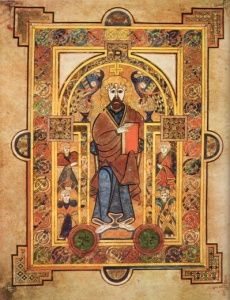I love studying the Christian Celts, particularly the golden period of the 5th to 8th century. What little we know about this world seems offer a balance to our world today. Their faith was less abstract and more rooted in every day living. Their prayers engage every activity of the day with God’s grace–from sweeping to stirring fires to milking cows to taking walks. They are rooted in community. They seem more in touch with creation.
It is easy to project back all our ideals to a period in the ancient past. (And to ignore many of their fatal flaws.) And we really don’t have enough information to paint a clear picture of that period. But we do have some writing and images that suggest a more integrated worldview between natural and supernatural as well as a connectedness to the land and the community/tribe.
While the Christian Celts may have brought some unique perspectives to the world, they also represent a way of thinking and living that was characteristic in that world. But this world came to an end. In a simplistic summary of history, I’ll point out a few major events.
The Western Church and the Eastern Church officially split in the Great Schism of 1054. While this split resulted from centuries of tension, it marks a formal break in the church that violates the love of God among His people.
A series of Crusades took place between 1095 – 1272. Millions of people lost their lives and the participation was debated then as now.
It appears to me that the next two events are judgments on the West possibly as a result of the Great Schism and some of the abuses of the Crusades but also maybe for other factors. These judgments in one sense represent the end of the medieval world (just as WW1 and WW2 represent the end of the modern world).
The Great Famine 1315-17 – While famines were a constant threat, this famine resulted in 1 million deaths, marking the end a population growth between the 11th and 13th centuries.
The Black Death – 1338 – 1375 – During these years, it is estimated that over 75 million people died. The Western world looked completely different. Entire towns ceased to exists, families lines ended, the social fabric fell apart.
The Medieval worldview did not have the energy to move this broken population forward. If we were using our terminology today, we might say that the world entered into a post-Medieval world. The world had to be rebuilt through new ideas, symbols, economic systems, cultural orders and more.
Part of reaching for a new world emerged in what we now call the Renaissance (14th – 17 th century). This emerging world had two competing interests: secular and Christian.
Martin Luther posts his 95 theses in 1517. While reforming voices and movements echoed through the church, this seems to mark the articulation that leads to a new world view. Secularist would prefer to speak of Renaissance, but I think the Reformation maybe the more defining transformation of the period. The energy of this worldview gave birth to modern science, classical music and more.
While the shift was not so dramatic, this new world gave birth to our modern world (both good and bad). The strain between secular and sacred only grew during this period. The doctrine of the Trinity was not guarded or articulated much during this period. James Jordan suggests that the unequally yoked marriage of Christianity and Greek thought propelled this world forward but eventually corrupted this world as well.
(I think Ingmar Berman’s “Seventh Seal” is exploring the end of the modern world via a story on the end of the medieval world while inverting Kirkegaard’s aesthete, ethicist and knight of faith.)
This world showed signs of breaking in the 19th century but the fundamental collapse was World War 1 and the echo of World War 2. We live in the arftermath of a world that died before most of us were born. Much like the post-medievalists, we live in a time that awaits a fresh articulation.
More on this later. I’m going to bed.


